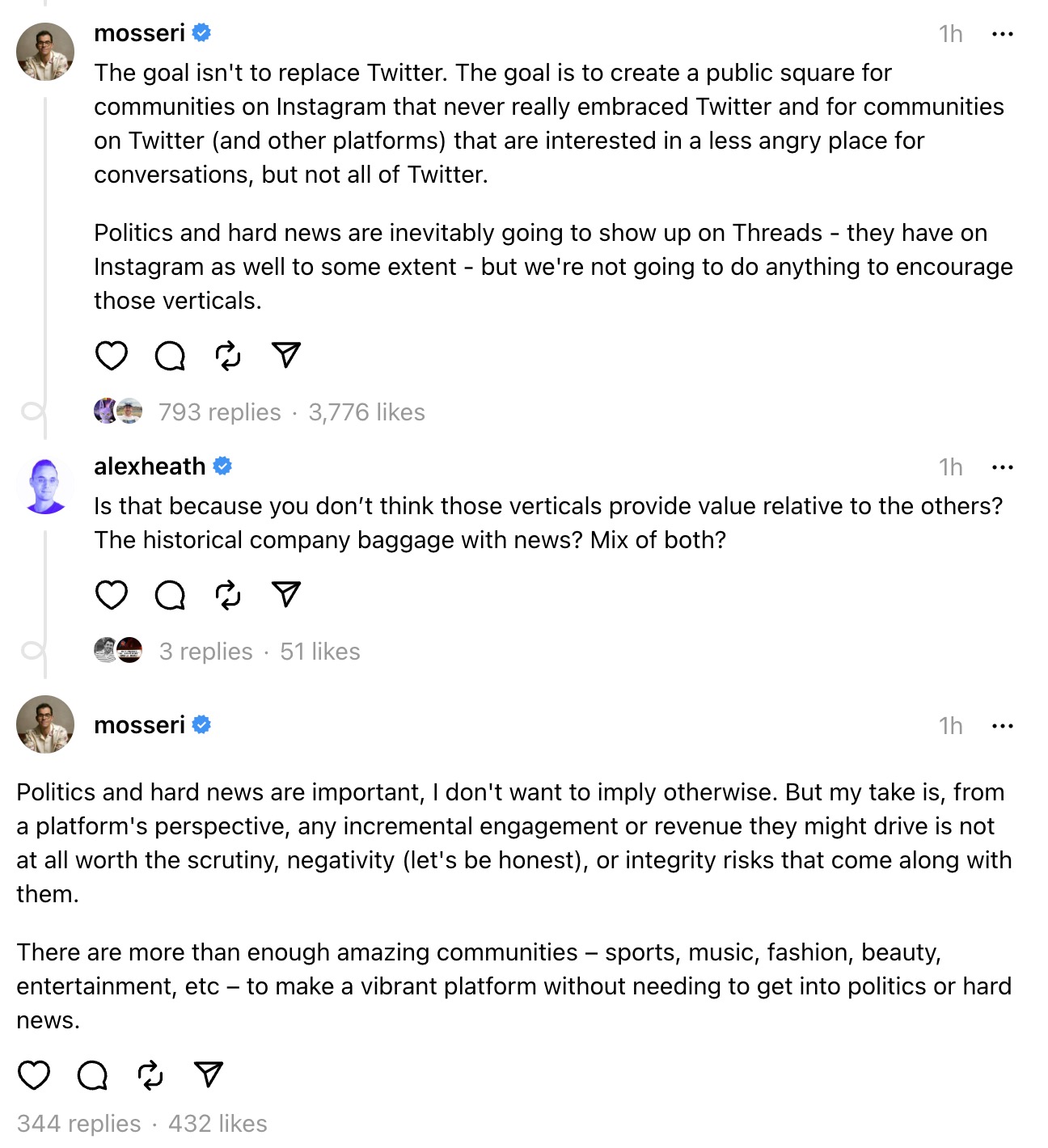Instagram Chief Executive, Adam Mosseri, has recently made clear the platform’s policy concerning political discourse and hard news following the launch of Meta’s new platform – Threads. Diverging from its competitor Twitter’s strategy, Mosseri articulated that Instagram will not be engaging in any strategies to actively promote politics and hard news.
Over recent years, Meta, the parent company of Instagram, has notably distanced itself from the political sphere and the realm of hard news, setting a stark contrast to Twitter’s new open encouragement of political dialogue.
Despite the shared ambition between Instagram’s new app, Threads, and Twitter, of transforming into a digital public square, Mosseri confirmed on a Threads post, “The goal isn’t to replace Twitter.” Instead, Threads is intended to serve as a hub for community discussions for those who may not be inclined towards Twitter or seek a less confrontational space for interactions.

However, Mosseri pointed out that while they anticipate politics and hard news will naturally make their way onto the platform, Instagram will not provide any incentives for those particular topics.
When queried by a user about the seeming contradiction between Threads’ aspiration to be a “public square” and the non-prioritization of political and news content, Mosseri clarified, “We won’t discourage or down-rank news or politics, we just won’t court them the way we have in the past.”
While the Instagram boss recognized the significance of politics and hard news, he stressed that, from a platform’s perspective, the potential increase in engagement and revenue they might generate does not justify the scrutiny, negativity, and integrity risks that inherently accompany them. Mosseri added, “There are more than enough amazing communities — sports, music, fashion, beauty, entertainment, etc — to make a vibrant platform without needing to get into politics or hard news.”
The launch of Threads has been successful so far, with Meta reporting that it has already amassed over 70 million users. The process to sign up to the new platform has been designed for user ease, requiring only an existing Instagram account and facilitating automatic sign-up to Threads.
The recent pronouncement by Mosseri, on the company’s deliberate disengagement from political content and hard news has triggered concerns about potential censorship and the suppression of “inconvenient” news stories. This raises the critical question of how social media platforms, as vital sources of information for millions, balance the interests of their users, advertisers, and their own corporate image.
Critics argue that this policy may sideline important news and political content that doesn’t align neatly with Instagram’s ambition to cultivate a less confrontational space for dialogue. Essentially, this has the potential to limit the range and depth of discourse, and, more importantly, to inadvertently distort the reality presented to Instagram users. While Instagram isn’t inherently a news organization, its vast user base means it plays a significant role in the dissemination of information, making any decisions about content promotion of serious consequence.
By promoting lighter, lifestyle-oriented content, Instagram is more attractive to advertisers seeking to avoid controversial or divisive subjects. The economic logic of this decision is clear – by creating a more harmonious, non-confrontational platform, Instagram provides a “safe” space for advertisers, enhancing its commercial viability.
Yet, critics express concern that this focus on “safe” content, driven by advertiser preferences, gives these advertisers undue influence over the platform’s content. This results in a form of “soft censorship” where less contentious, yet less critical, topics are prioritized. It’s an alarming scenario – a social media platform being swayed by the commercial forces and corporate interests rather than its responsibility to encourage a broad range of dialogue.










